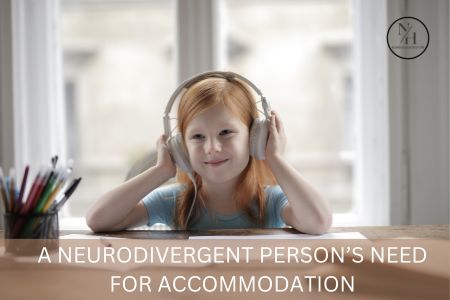What if neurodivergence is not something that needs to be fixed, but something to embrace? Maybe then we can make the accommodations that our or our loved ones’ neurodivergent minds need.
In the old days, the child diagnosed with a neurodivergent condition was seen as someone having problems that we could—and should!—troubleshoot and find a solution for. However, in recent years, research has continually shown that one’s neurodivergence does not go away with age. As such, it becomes more important than ever to be aware of the neurodivergent person’s needs, so that we can make the necessary accommodations.
What are Neurodivergent Accommodations?
Accommodations for the neurodivergent persons in our lives can come in many ways. Most of it takes into account the sensory sensitivities and emotional needs to make things more tolerable, and possibly, easier.
Giving accommodations does not mean we are just “tolerating” them or their meltdowns—on the contrary, being open to adjustment means that we are willing to work with the neurodivergent persons in our lives to reduce potential triggers or stressors, helping them to function at their full potential.
Here are some of the most common accommodations that neurodivergent individuals usually need:
Stimulus-Blockers (e.g. Noise-Cancelling Headphones)
A big percentage of neurodivergent persons are highly sensitive to sensory input (and may even have sensory processing disorder, or SPD). This can come in the form of bright lights, persistent noise, or uncomfortable textiles or food textures.
Why does this happen? Neuroscientists are exploring the idea that this hypersensitivity may be because of a lower supply of neuron-inhibitors, which are responsible for calming the activity of neurons. With this lower supply, a person’s nerves do not revert back to calmness and instead continue to react to the stimulus.
If the stimulus is bright lights, we can encourage the use of sunglasses or caps. If we’re not aware of this need, we might label a person weird for wearing sunglasses or caps inside a mall, without knowing it’s the bright LED lights causing stress.
If the stimulus is sound, noise-cancelling headphones and earplugs are found to be helpful.
Note that what can be considered white noise by many neurotypical individuals may be truly grating to a person with sensory challenges: for example, the sound of finger-drumming on a desk, knuckle-cracking, or foot tapping can agitate a person with high sensitivity to sounds.
These tools that help deaden or soften sound have been shown to improve how neurodivergent people function in school or at work, thanks to the lesser stress levels and distraction.
Clearly written-down instructions
Some neurodivergent individuals, such as those with ADHD or dyslexia, struggle with remembering lists and a series of instructions.
When we understand this natural brain wiring, we stop being frustrated when they can’t follow directions that were given verbally. We can help them perform better by ensuring that anything that needs to be done is written down in clear, concise instructions.
Focused work time and distraction-free workspace
Many people with autism have found a special gift for hyper focus, or pouring their all into a project until they bring it to successful completion. This can be short-circuited with frequent distractions, especially since, once veered off the path, it can be difficult for them to get back into “the zone.”
When we understand this, we can prioritize a distraction-free work area and a devoted time for work so that we can maximize the way their brains work.
Respect for schedules
Many autistic individuals thrive on structure and get agitated when things don’t go as planned, or with being late to appointments. If you work with or live with somebody with this trait, and it so happens you prefer more spontaneity and don’t mind being late, it can be a constant cause of friction!
Hopefully, understanding how each person views schedules and the idea of time can help you work together better.
Fidgeting devices
Some neurodivergent individuals benefit from using fidget toys or devices, as these reportedly calm them down from emotional dysregulation. When we are not aware, we might be too rigid about what items we allow, for example, for a child in school or someone in the workplace.
Understanding the purpose of such devices for these individuals means that we can make room for them.
Accommodations Depend on the Need
This is just an overview list of some of the most common accommodations that a neurodivergent person may benefit from. Remember that some of these adjustments may be common among all neurodivergent individuals, while others still differ on a case-to-case basis.
The important thing is that we understand that these accommodations serve to help them function to their full potential, and it’s perfectly fine to give room for these items.

